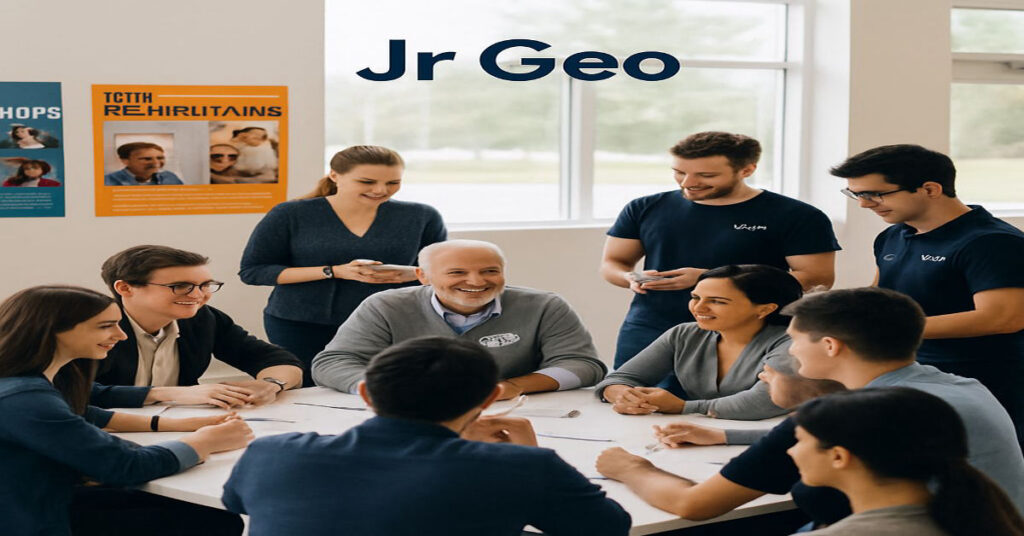Jr geo refers to interactive community‑focused groups that champion youth engagement, rehabilitation, and local involvement. Readers will learn what Jr geo is, how it shapes community programs, and why it matters today.
What is Jr geo ?
Jr geo refers to a movement or group that brings together young individuals, professionals, and community leaders to collaborate on social impact and rehabilitation initiatives. It’s seen being used in posts highlighting youth workshops and community care efforts.
Origins and Purpose
The concept originated as a youth community of practice that meets regularly to address local issues. It evolved to include rehabilitation support, community service, and structured programs backed by evidence‑based approaches.
Key Focus Areas
a) Youth engagement
— Monthly meetings to discuss projects and share ideas.
— Initiatives that empower youth to lead community work.
b) Rehabilitation and re‑entry
— Support for people transitioning back into society.
— Residential and outpatient programs offering vocational training.
c) Community service
— Local clean‑ups, school supplies drives, food support.
— Collaborations with civic groups, shelters, and special events.
Example: Youth Community of Practice
A youth community of practice meets monthly at 3 pm CEST, focusing on:
- How youth contribute to leadership
- Ongoing collaborative projects
- Open discussions on community roles
This structure encourages active involvement and creative problem‑solving.
Reentry and Rehabilitation Programs
These programs support individuals returning from custody. Posts mention:
- Residential centers in Pennsylvania beautifying urban areas
- Staff and residents working together for city renewal
Such efforts build skills, restore dignity, and strengthen community ties.
Community Engagement Initiatives
Examples include:
- Quarterly advisory boards bringing together local leaders and facility staff
- Volunteer events like school supply packing and feeding the homeless
These show a united front of youth, professionals, and volunteers improving local wellbeing.
Benefits and Impacts
- Youth gain leadership experience
- Program participants receive job training and support
- Local communities get direct improvements and involvement
- Trust is built among institutions, participants, and residents
Case Study: Pennsylvania Reentry Center
At a residential reentry center:
- Residents and staff painted buildings, cleaned parks, and beautified neighborhoods
- This fostered collaboration and gave participants practical skills and community pride
Relevant Data Table
| Focus Area | Description | Frequency/Scale |
| Youth meetings | Monthly youth‑community gatherings | Monthly at set times |
| Advisory boards | Facility‑community leadership meetings | Quarterly |
| Rehabilitation efforts | Residential reentry and vocational training | Rolling participation |
| Community service | Back‑to‑school, meals, facility beautification | Multiple events annually |
| Volunteer partnerships | Collaboration with civic groups, shelters, and school systems | Continuous involvement |
Conclusion & Call To Action
Jr geo is a dynamic blend of youth empowerment, rehabilitation programs, and community service. It brings real‑world improvements, builds trust, and creates inclusive opportunities.
If you’re passionate about youth engagement or reentry initiatives, consider:
- Joining a local jr geo‑style group
- Volunteering at community events
- Sharing this article to raise awareness
Frequently Asked Questions
What is the main goal of Jr geo groups?
To connect youth, professionals, and community leaders in collaborative service, leadership development, and rehabilitation.
How often do events occur?
Youth groups meet monthly; advisory boards convene quarterly; volunteer events occur throughout the year.
Who runs these programs?
They are organized by facility staff, community leaders, and youth participants collaboratively.
Is participation open to the public?
Yes, events welcome community volunteers, agencies, youth, and service providers.
What skills do participants gain?
Leadership, teamwork, practical job skills, civic awareness and emotional resilience.

